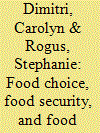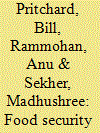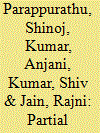|
|
|
Sort Order |
|
|
|
Items / Page
|
|
|
|
|
|
|
| Srl | Item |
| 1 |
ID:
130295


|
|
|
|
|
| Publication |
2014.
|
| Summary/Abstract |
Economics, nutrition, and public health literature includes much research on the factors that influence food choice and attempts to understand the factors contributing to low food security. Economic factors, such as prices and income influence food choice and food security, as do access and availability of food. Yet recent literature indicates that behavioral factors- such as the physical environment and market strategies, including package size and product placement have equal importance.
|
|
|
|
|
|
|
|
|
|
|
|
|
|
|
|
| 2 |
ID:
121112


|
|
|
|
|
| Publication |
2013.
|
| Summary/Abstract |
Contemporary India possesses a food security paradox-progress in combating food insecurity is occurring at a slower pace than might be expected, given the nation's rapid economic growth. This paper provides a conceptual framework to explain this phenomenon. Drawing on the work of Amartya Sen, it uses a broadly framed analysis to conceptualise the problem in terms of the interactivity between three types of entitlement failure. Firstly, pure exchange system entitlement (abilities to obtain food from welfare programmes) has been curtailed by institutional shortcomings in pivotal programmes. Secondly, opportunities for wage-labour entitlement (abilities to obtain food from monetary incomes) have been restricted for vulnerable households because of the sequencing and geographical patterning of recent economic growth in India. Thirdly, opportunities for vulnerable households to address their needs through own-production entitlement (abilities to grow one's own food) have been curbed by land fragmentation and environmental degradation. These interactions have created vicious cycles of food insecurity for vulnerable households. Through this approach, the deeper causal roots of India's food security paradox are articulated, thus underscoring the importance of multi-pronged, holistically constructed policy agendas.
|
|
|
|
|
|
|
|
|
|
|
|
|
|
|
|
| 3 |
ID:
130918


|
|
|
|
|
| Publication |
2014.
|
| Summary/Abstract |
A far-sighted food policy is essential to facilitate efficient functioning of food production and management systems, especially for a country like India where household level food security still remains elusive. In this context, reliable mechanisms for generating outlooks on key variables such as demand, supply, trade, prices, etc., of important food commodities forms an essential basis for planning. This paper explores the theoretical underpinnings as well as practical applications of the Cereal Outlook Model, a dynamic, partial-equilibrium model, developed by the authors with the specific purpose of generating future outlooks on major cereals in India. Based on this, projections as well as policy simulations on main demand and supply side variables of rice, wheat and maize were carried out for the period spanning 2011-2025. The model results indicate fast-growing trends in demand and supply of the three cereals considered. Though growth in demand would be sufficiently high due to growing per capita income, population and urbanisation; supply would keep pace owing to the emergence of new areas contributing towards incremental production. Consequently, the net trade of all three commodities would remain positive, though some signs of tapering off in net trade are expected in case of wheat and maize.
|
|
|
|
|
|
|
|
|
|
|
|
|
|
|
|
|
|
|
|
|